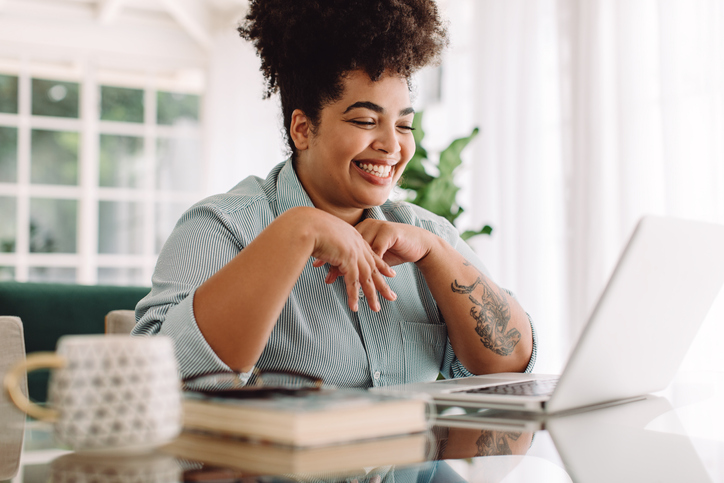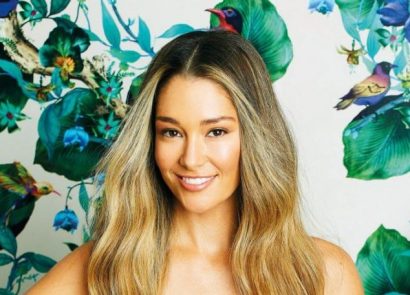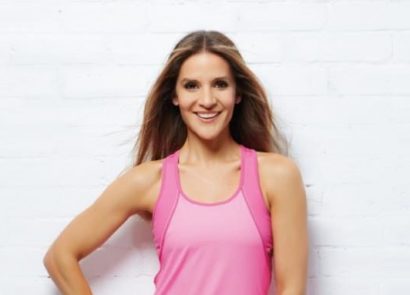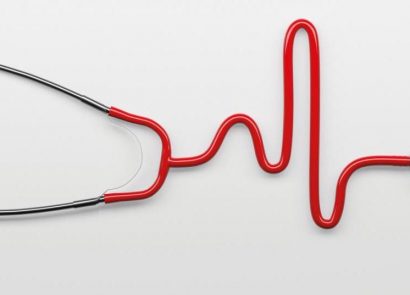In the year where life as we knew it changed irrevocably – commuting to work came to a grinding halt, connections with friends and family over Zoom became the norm and Instagram was littered with sourdough starters – the door to routine and everyday comforts was firmly closed. For some, the period of grievance was for loved ones, but for others, losing a sense of self left us in a pool of deeper questions and wondering whether we actually wanted to return to the old normal, with lifestyle changes at the forefront of our minds, in particular. Whether it be reimagining future goals, walking away from a relationship, brushing up on cooking skills or even getting an exercise routine off the ground, both micro and macro changes enhance our lives, and show us that a change of direction can be a positive one. For many people, the pandemic was responsible for an unsolicited shift in our way of living, forcing us into realising that we weren’t actually living to our fullest potentials, but simply existing in line with what others expected of us.
Grinding gears
One of those people was Katrina Hicks, a 30-year-old part-time office worker and mum-of-two from London. Prior to the pandemic, Katrina suffered a breakdown and felt like she was existing “on auto-pilot.”
“It was like living in Groundhog Day, when every day felt the same on loop. To say I felt trapped in a job that wasn’t pushing me further would be an understatement. I kept dismissing my own feelings, as I had a family to feed and a job waiting for me after being on maternity leave. Once I pressed pause and really realised something wasn’t right with me, I realised just how desperately unhappy I was.”
During lockdown, Katrina lost two family members and reached an all-time low point. “I found myself revisiting who I was as a child. Back then, I was always really creative and felt the most confident in my abilities when writing.”
“Having lost a lot of confidence over the years in my previous job role, writing became therapeutic,” she said. “Through the process, I rediscovered my love for writing and kept pushing myself to create something new and personal to me.”
Since gaining the confidence to make a change, Katrina has secured a role in freelance writing and now works in housing support, with more projects in the pipeline.
Lockdown revelations
Katrina wasn’t alone in wanting a fresh start, either. Back in June 2021, a survey conducted by Microsoft revealed that 41 percent of workers globally were thinking about handing in their notice.
And it wasn’t just a change of career paths people were concerned with, but relationships, too. The pandemic triggered a spike in divorce cases, with one leading British law firm seeing a shocking 122 percent increase in divorce enquiries in the height of lockdown.
While many people were thinking about their love life, health and longevity weren’t far from thoughts, either, with NHS-led app Couch to 5k experiencing one million downloads over lockdown – a 92 percent increase on last year. The same number of people decided to kick their smoking habit too, thanks to lockdown. Lockdown transformed lifestyles, with one goal in mind: the future.
Almara Abgarian, 32 from London was determined to put her future first by seeking therapy for her attitude towards relationships, as well as quitting smoking and shifting her mindset on food. “At the start of lockdown, I had an online relationship that didn’t work out and it triggered an emotional shift in me to confront my attitudes towards intimacy and dating. I hired a therapist to speak to once a month, or more if I needed to, to evaluate my own behaviours,” she said.
Almara admits that her relationship with exercise and eating was somewhat rocky. “I enjoyed the gym, but found it hard to stay motivated, and I was scared of the weights section – I didn’t know how the machines worked, and I was overweight, so I felt like I was being watched by other gym-goers.”
Almara said that she regularly snacked during long working hours, ordering takeaways which ended up becoming “a bad habit.” She added: “My lifestyle was having an negative impact on my health and wellbeing.
I was always working; I’d smoke 10 cigarettes a day as a result of the stress, which only escalated during lockdown. “When I was about to turn 32 earlier this year, I got a really bad cough and I felt really lethargic. My mental health wasn’t in a great place and I was fed up with dating after my break-up,” she shared. “Lockdown gave me some time to gain some self-awareness and really think about my future.
“After speaking to someone about romantic relationships, I managed to finally come to terms with what I wanted and how to put myself first for once,” she said. “I’d really recommend therapy to anyone, even if you think your problems are small.”
Coupled with therapy once a month, six months ago, Almara joined a fitness and healthy eating programme and has since lost 1.5st. “It wasn’t about getting thinner, but about changing my lifestyle,” she said. Now, she lifts weight three times a week and cooks her own meals in line with her new, healthier lifestyle.
Almara goes for walks every day to help her mental health, and has recognised the importance of listening to her body and heart.
“My attitude towards dating, eating and exercising has changed completely since lockdown – for the better.”
While change is part-and-parcel of life, we tend to fear it because we can’t anticipate the outcome and stressful situations (hi, global pandemic) can make us react impulsively, whether we feel shocked, anxious or upset about something. “Change is an opportunity to embrace and grow beyond what feels comfortable, build resilience and experience new things that we might have never done,” says Dr Lynda Shaw, psychologist and change specialist (drlyndashaw.com). It takes a lot of mental strength to be sure that you’re on the right path, so Dr Shaw recommends thinking as positively as possible in order to encourage those feelings that we tend to white-knuckle, such as comfort and reassurance.
“A positive mindset can be the deal-breaker between you doing something or not. The outcomes are predictably in favour of someone who is often positive, rather than someone who is usually negative. Being positive is the best way to learn and move on.”
Schooling life
Another woman who also felt inclined to scratch that itch to dive in and try something new, is former bakery worker, Lillie Bear-McGuinness, a 27-year-old student nurse from Newcastle. Admitting that it took until lockdown to step back into education, Lillie’s mornings used to consist of an alarm set for 3am, proving and pastries.
“It was a really intense environment to work in and the shifts were long with few breaks. On my days off, I’d produce chocolates for my business, attend markets and run my website,” she explains. “I found that working in hospitality and running my own business wasn’t enjoyable – I was getting older and I decided I needed to make a change to my life.”
With healthcare occupations running in the family, Lillie decided to apply to study to be a nurse in January 2020 and was accepted on to the course in the height of lockdown that September, with the pandemic only fuelling her determination to change direction by getting back into education, and the community.
Lillie admits that the pandemic has been hard for student nurses, with her first work placement on a COVID ward which “will stay with me for the rest of my life,” she said. “While being part of a generation of student nurses that have only worked during a pandemic has been extremely challenging, it’s also unbelievably rewarding. I love my job; I love being a nurse.”
Now, Lillie’s lifestyle as a nursing student is “completely different” meaning that she can wake up at 7am, instead of 3am.
“I feel healthier and happier. I now spend my days off with my friends on the course, attending online lectures and going to the gym. I feel so empowered with my life change, for the first time in my life I feel intelligent and confident.
“I illustrate part-time and I’ve taken commissions for local businesses. I bake more than ever now as well, which my family and husband are pretty thrilled with,” she said.
Leap of faith
Entrepreneur and coach, Catrin MacDonnell (catrinmacdonnell.co.uk), coaches people going through transition, who want to change aspects of their life. “We often wait for things to get really hard before we make those changes, we perhaps have been thinking about it for a long time, or something extreme happens that forces us to jump.
“The pandemic forced change for many and made us really question our work and lives, partially because we actually had time to think and just be. For some, it’s actually been an opportunity to reassess and make the changes they’ve always wanted to. When you’re in a day-today cycle, you might have an underlying feeling of discontent, but just keep going. The pandemic has broken the cycle and meant people have stopped to think.”
While change of direction is ultimately a good thing, it’s important to consider the potential consequences of this new change – and whether making the leap without careful planning, or financial backing, is worth the outcome.
“Carrying on with a level of stress and discontent isn’t good for anyone and anything that gets us to find the courage to change things for the better can only be a good thing,” Catrin added.
Lastly, it’s important to make sure that you’re not acting on a knee jerk reaction, and that you’ve sought out as much advice and support as is necessary for you to change your lifestyle, habits or even relationships.
And, it’s okay if you’re not quite ready yet – aligning with your true-life purpose and discovering that courage to admit that you need to embrace change can take some time to process, even when it feels like you’re getting left behind.
Dr Shaw agrees, adding: “Learn that it’s OK to fail and learn how to fail well by picking yourself up and trying again using different tactics. Having your own strong inner support system is important during times of change.” And if you start to get those feelings of self-doubt creep in? “Talk to yourself in the same way you would speak to and coach a friend,”
Dr Shaw suggests. “Dismiss constant negative internal chatter and replace it with gratitude and an occasional pat on the back for trying your best.”



















